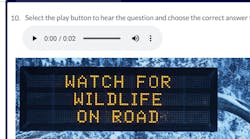What's at stake with Supreme Court hearing AB 5 case?
The saga over how California will define the employment status of truckers is nearing the endgame, as the California Trucking Association is seeking final adjudication from the U.S. Supreme Court to determine if the Federal Aviation Administration Authorization Act of 1994 preempts the use of AB 5’s (California Assembly Bill 5) ABC Test. The CTA’s plan to petition the highest law of the land was announced on June 21 after the Ninth Circuit Court denied the association’s request to rehear CTA v Bonta.
In the interim, the Ninth Circuit has granted an injunction to halt the ABC test going into effect, which replaced the Borello Multifactor test.
Under the ABC test, a person is an independent contractor if:
A. The person is free from the control and direction of the hiring entity in connection with the performance of the work, both under the contract for the performance of the work and in fact.
B. The person performs work that is outside the usual course of the hiring entity’s business.
C. The person is customarily engaged in an independently established trade, occupation, or business of the same nature as that involved in the work performed.
A 2018 case, Dynamex Operations West, Inc. versus Superior Court (Dynamex), legitimized the ABC test, though the CTA has kept its enforcement in legal limbo while the courts weigh if the state law supersedes federal law.
AB 5 was signed into law in 2019 to protect state gig workers, though the CTA argues it limits truckers’ entrepreneurial freedoms.
If the Supreme Court chooses not to hear the case, a decision that will be made by November 2021, the stay will be lifted. In April, the Ninth Circuit ruled 2-1 to uphold the ABC Test that identifies who is an independent contractor and who is an employee.
At stake is the ability of California truck drivers to decide their own future. A CTA study released in 2015 found owner-operators earned about 40% more ($59,478) than the median for company drivers ($42,087), based off 2013 data.
“Implementing California’s new classification test before this case is finalized would have been detrimental to the more than 70,000 independent owner-operators operating within the state,” said CTA CEO Shawn Yandon in a statement supplied to FleetOwner. “The decision by the Ninth Circuit Court to delay removing the preliminary injunction is a win for California’s independent truckers who will be able to continue providing for themselves and their families as we petition the U.S. Supreme Court for review.”
The International Brotherhood of Teamsters served as intervenor-defendant during the April hearing, and the union’s reason for supporting the ABC test comes down to protecting port drivers.
“Court after court and government agency after agency have repeatedly and uniformly found misclassified drivers to be employees under the Borello test,” said Ron Herrera, Teamsters International vice president and director of the Port Division, in March. “The ABC test, however, streamlines the process of establishing employee status.”
Herrera pointed to the health emergency caused by the COVID-19 pandemic as further proof these drivers need more legal protections, which would not be available to independent contractors.
“Unemployment benefits, disability benefits and sick leave benefits—which require an employee status determination—are critical to misclassified drivers whose employers force them to pay unlawful deductions and make truck payments even when they are not working, while denying them employer-provided health and sick leave benefits,” Herrera said.
While both sides say they have the drivers’ interest at heart, the ABC test may create a negative impact on the California economy.
Gregory Feary, president and managing partner of transportation law firm Scopelitis, noted that many owner-operators might take issue with the reduction in pay and being told they cannot own their own business, which will create even more issues.
“You've got this tension where even though the government may want all of these truck drivers to be employees, the truck drivers themselves may not want that,” Feary said.
One issue is that these truckers own their own tractors, which are not paid off. Going the company route may mean they must find a new home for their truck, possibly at a loss. These truckers, who already decided for themselves the rewards outweigh the risks of being a business owner, may then leave the Golden State to improve their earning potential. This would exacerbate the driver shortage issue for California, the state with the highest GDP in the U.S.
“You're going to have a shortage of truck drivers and trucks in California, which means that the ripple effect will be on the ultimately on the consumer,” Feary theorized.
So what is the likelihood the case will even get to the Supreme Court?
“It's a classic case of the independent business interests versus the paternalistic, protective interest,” Feary said. “It's hard to handicap what the Supreme Court takes, because they have so many circuit petitions every year, but I think this has I think this has a strong chance.”
One thing in the CTA’s favor is that the First and Ninth Circuits disagreed over the ABC test, and when that happens, the Supreme Court is more likely to intervene.
Feary noted even if the Supreme Court denies the petition or rules in the state’s favor, courts would determine a driver’s employment standing individually, and that the law “isn’t a light switch.” It will spark a flurry of legal costs at a time when truckers are also told they need to invest in more safety technology, fuel efficiency and while insurance premiums are on the rise due to nuclear verdicts.
And as California trailblazed time mandates for when the trucking industry must adopt zero-emission vehicles, the state could also influence if the ABC test is applied across the country.
“[The final ruling] will be significant to other states that are considering similar laws,” Feary said, noting New Jersey is the likeliest candidate to follow suit.




